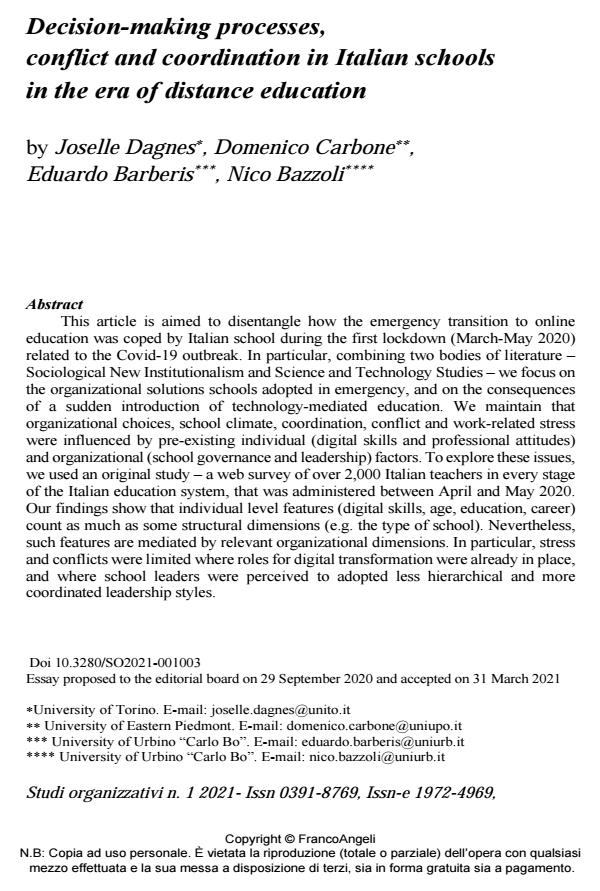Decision-making processes, conflict and coordination in Italian schools in the era of distance education
Titolo Rivista STUDI ORGANIZZATIVI
Autori/Curatori Joselle Dagnes, Domenico Carbone, Eduardo Barberis, Nico Bazzoli
Anno di pubblicazione 2021 Fascicolo 2021/1
Lingua Inglese Numero pagine 28 P. 51-78 Dimensione file 352 KB
DOI 10.3280/SO2021-001003
Il DOI è il codice a barre della proprietà intellettuale: per saperne di più
clicca qui
Qui sotto puoi vedere in anteprima la prima pagina di questo articolo.
Se questo articolo ti interessa, lo puoi acquistare (e scaricare in formato pdf) seguendo le facili indicazioni per acquistare il download credit. Acquista Download Credits per scaricare questo Articolo in formato PDF

FrancoAngeli è membro della Publishers International Linking Association, Inc (PILA), associazione indipendente e non profit per facilitare (attraverso i servizi tecnologici implementati da CrossRef.org) l’accesso degli studiosi ai contenuti digitali nelle pubblicazioni professionali e scientifiche.
This article is aimed to disentangle how the emergency transition to online education was coped by Italian school during the first lockdown (March-May 2020) related to the Covid-19 outbreak. In particular, combining two bodies of literature - Sociological New Institutionalism and Science and Technology Studies - we focus on the organizational solutions schools adopted in emergency, and on the consequences of a sudden introduction of technology-mediated education. We maintain that organizational choices, school climate, coordination, conflict and work-related stress were influenced by pre-existing individual (digital skills and professional attitudes) and organizational (school governance and leadership) factors. To explore these issues, we used an original study - a web survey of over 2,000 Italian teachers in every stage of the Italian education system, that was administered between April and May 2020. Our findings show that individual level features (digital skills, age, education, career) count as much as some structural dimensions (e.g. the type of school). Nevertheless, such features are mediated by relevant organizational dimensions. In particular, stress and conflicts were limited where roles for digital transformation were already in place, and where school leaders were perceived to adopted less hierarchical and more coordinated leadership styles.
Questo articolo si concentra su come le scuole italiane abbiano affrontato il passaggio emergenziale alla didattica a distanza durante il primo lockdown (Marzo-Maggio 2020) a seguito dei provvedimenti di emergenza per il contenimento della pandemia da Covid-19. Dal punto di vista teorico, l’articolo prende le mosse da due corpus di letteratura: il neoistituzionalismo sociologico, che mette al centro dell’attenzione il ruolo degli attori sociali nel cambiamento organizzativo (le basi su cui fondano le loro decisioni, tanto quanto l’interazione fra chi promuove il cambiamento e chi vi resiste; gli studi su scienza e tecnologia (STS) che si concentrano sull’implementazione delle innovazioni tecnologiche - influenzata dai rapporti di potere e dalle strutture organizzative, ma che a loro volta intervengono a modificare tali rapporti e strutture. Nel nostro caso, ci interroghiamo su una innovazione organizzativa e tecnologica - quella della didattica a distanza - non pianificata, di carattere emergenziale. In questo articolo ipotizziamo che le scelte organizzative adottate a livello di singola scuola, il clima scolastico, il coordinamento e il conflitto fra i protagonisti della scuola (dirigenti, docenti, studenti, famiglie) sia influenzato sia da caratteristiche individuali (come l’età e il titolo di studio), sia da caratteristiche della scuola (come la sua struttura interna e lo stile di leadership adottato dalla dirigenza). Per esplorare questi temi, facciamo ricorso ad una web survey cui hanno partecipato più di 2.000 docenti italiani impiegati in scuole di ogni ordine e grado, somministrata fra aprile e maggio 2020. I risultati mostrano come stress lavoro-correlato e conflitti legati all’implementazione delle nuove modalità didattiche emergenziali siano mediati da alcune caratteristiche organizzative fondamentali, in particolare in relazione alla presenza di una pregressa struttura organizzativa (un delegato, un team) per gestire l’innovazione digitale ed allo stile di leadership adottato dai dirigenti degli istituti.
Parole chiave:Covid-19, scuola, leadership educativa, gestione delle emergenze, conflitto organizzativo
- La ricalibratura delle policy sull’ICT nella scuola italiana: “lezioni” dalla DaD Domenico Carbone, Cristina Calvi, Anna Rosa Favretto, in Cambio. Rivista sulle Trasformazioni Sociali /2024 pp.123
DOI: 10.36253/cambio-15541 - The Digitisation of Italian Schools and the Pandemic Trigger: Actors and Policies in an Evolving Organisational Field Domenico Carbone, Cristina Calvi, in Societies /2024 pp.94
DOI: 10.3390/soc14060094
Joselle Dagnes, Domenico Carbone, Eduardo Barberis, Nico Bazzoli, Decision-making processes, conflict and coordination in Italian schools in the era of distance education in "STUDI ORGANIZZATIVI " 1/2021, pp 51-78, DOI: 10.3280/SO2021-001003